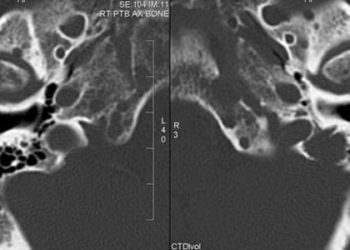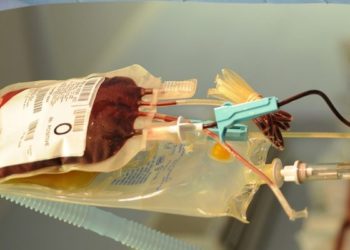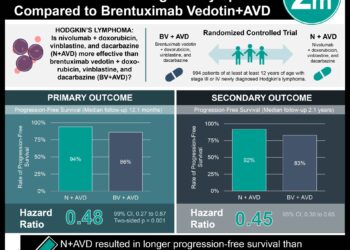Autologous stem-cell transplantation benefits high-risk patients with non-Hodgkin’s lymphoma
Image: PD
1. Autologous stem-cell transplantation improved progression-free survival in patients with high-intermediate-risk and high-risk disease, but did not show improvement in overall survival.
2. Retrospective subgroup analysis suggests that early transplantation may provide greater benefit to patients with high-risk disease than patients with high-intermediate-risk disease.
Evidence Rating Level: 2 (Good)
Study Rundown: This study suggests a survival benefit of early autologous stem-cell transplantation in intermediate-high-risk and high-risk patients with non-Hodgkin’s lymphoma, categorized by the International Prognostic Index (IPI) score. Standard therapy for patients with non-Hodgkin’s lymphoma generally proceeds with the regimen of cyclophosphamide, doxorubicin, vincristine, and prednisone (CHOP), often with the addition of the anti-B-cell monoclonal antibody, rituximab (R-CHOP) in patients with CD20+ disease. The role for transplantation once initial remission has been achieved remains controversial, though some studies suggest a benefit in patients with high-intermediate-risk and high-risk disease. This study specifically enrolled patients with these higher-risk IPI scores to evaluate this question and found that transplantation improved progression-free survival for both high-intermediate-risk and high-risk patients. Transplantation appeared to have a greater benefit in high-risk patients, reflected in both progression-free survival and overall survival. However, this finding was identified in retrospective subgroup analysis. Further studies should be powered to elucidate this correlation and determine other mechanisms of matching optimal therapies to disease subtype.
Click to read the study, published today in NEJM
Click to read an accompanying editorial in NEJM
Background Reading: NCCN Clinical Practice Guidelines: Non-Hodgkin’s Lymphomas
In-Depth [randomized, controlled trial]: This study examined the role of early autologous stem-cell transplantation in the treatment of patients with non-Hodgkin’s lymphoma, classified as either high-intermediate-risk or high-risk by IPI score. The authors recruited a total of 397 patients with biopsy-confirmed non-Hodgkin’s lymphomas. They excluded patients with lymphoblastic, transformed, or mantle-cell lymphomas. Patients were then evaluated by IPI score and determined to be high-intermediate-risk or high-risk. Of the total group, 253 eligible patients underwent induction therapy consisting of 5 weeks of CHOP or R-CHOP depending on the CD20 status of the cancer. Once induction was achieved, patients were randomized to receive either three additional cycles of induction chemotherapy (control group) or one cycle of chemotherapy and autologous stem-cell transplantation (transplantation group). The 2-year progression-free survival rates in the transplantation and control groups were 69% and 55%, respectively (hazard ratio in the control vs. transplantation group, 1.72; 95%CI: 1.18 to 2.51; P=0.005). The 2-year overall survival rate did not differ significantly between groups. However, subsequent, exploratory subgroup analysis showed a significant interaction between risk level and overall survival. In high-risk patients, the 2-year overall survival rate was greater in the transplantation group compared to the control group (82% vs. 64%).
By Akira Shishido, MD and Adrienne Chueng
More from this author: Pneumocystis linked to sudden infant deaths, Continuous infusion of beta-lactams may be superior to bolus therapy, Novel antiviral drug reduces influenza viral load, Three months of antibiotics appear to effectively treat early-onset spinal implant infections
© 2013 2minutemedicine.com. All rights reserved. No works may be reproduced without expressed written consent from 2minutemedicine.com. Disclaimer: We present factual information directly from peer reviewed medical journals. No post should be construed as medical advice and is not intended as such by the authors, editors, staff or by 2minutemedicine.com. PLEASE SEE A HEALTHCARE PROVIDER IN YOUR AREA IF YOU SEEK MEDICAL ADVICE OF ANY SORT.







